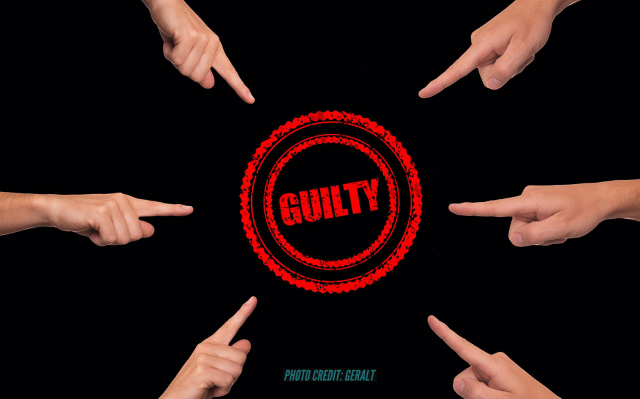The Report Card on Guilt

Vibrational Frequency: 30
Emotional State: Fault
Life View: Malevolent
“Guilt creates a burdensome feeling but can provide an avenue for redemption.”
Guilt is a self-conscious revulsive emotion. It is an emotional response to one’s harmful behavior towards another. A painful self-appraisal of wrongful action characterizes it. Guilt is often related to a strong dread of public exposure and ridicule. The usual response to guilt in a normal person is to mitigate the results of the wrongdoing. Not a bundle of perfection, humans can make irreparable blunders and can end up carrying the burden of guilt all their lives. Several sources, including family, culture, religion, and society, can contribute to guilt.
Some psychologists believe that the feeling of guilt is ubiquitously important in our ethical lives. Some also insist guilt be of two kinds- healthy and unhealthy. This report card is on unhealthy guilt that causes impairment in a person.
Guilt is a complex state that can arise in us in many ways –
- It can persist for a long time or can be fleeting and superficial.
- It can be a persuasive factor to take the correct action or wrong action.
- Some people seldom feel guilty, but others feel guilty to the extent of impairment to live constructive lives.
- One could feel guilty for making a wrong action or for not taking the right action.
- Guilt could be felt over feelings that we may have or failed to have, or secret wishes or our imaginings.
Some Effects of Guilt
- Self-reproach
- Self-doubt
- Prone to accidents
- Self-destructive behaviors
- Amorality to mask guilt
- Extreme sensitivity
- Low self-esteem
- Self-detriment
- Insomnia, eating disorders
There is some evidence of developing serious disorders like anxiety, depression, and obsessive-compulsive disorder when guilt is not addressed. Letting go of guilt is not the same as being insensitive to the damage that occurred by self.
Realize
- Explore the reason for your guilt
- Assess if the guilt you feel is because it was against your moral judgment or because it is a projection of an external factor (something that was unacceptable to family, society, cultural norms, or religious tenet)
Recognize
- Assess if your action was in line with your convictions
- Know if you hurt a person, place, or thing
- Understand why you behaved or acted in a certain way that transpired the feeling of guilt as a result
Respond
- If you acted against your conviction, then know that you were wrong
- Apologize if you offended a person, but know that it is that person’s prerogative to forgive you or not
- Make amends
- Forgive yourself
- This is more difficult than asking others to forgive you, but self-love plays a critical role
- Accept that you are human and to err is human
- Change your attitude/mindset
- Don’t forget to introspect and write down your feelings related to this emotion
References
Goodtherapy.org. Available at: https://www.goodtherapy.org/learn-about-therapy/issues/guilt [Accessed 13 April 2021].
Neblett, William. “The Ethics of Guilt.” The Journal of Philosophy, vol. 71, no. 18, 1974, pp. 652–663. JSTOR, www.jstor.org/stable/2024803. Accessed 4 May 2021.
Psychology Today. 2021. The Definitive Guide to Guilt. [online] Available at: https://www.psychologytoday.com/us/blog/fulfillment-any-age/201208/the-definitive-guide-guilt [Accessed 13 April 2021].
